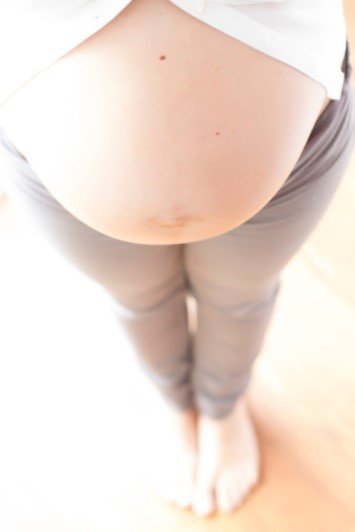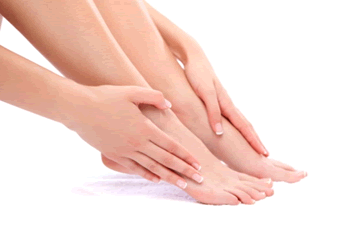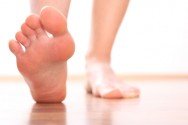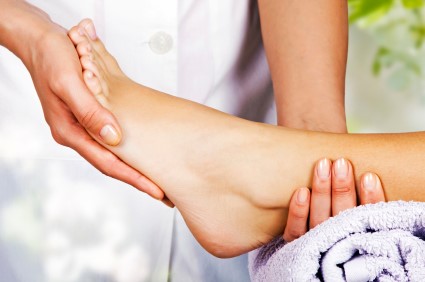October 2015
Pregnant Woman Treated Poorly By Fellow Passenger on Train
 Mhari-Claire Doolan had boarded a train to Manchester in late August when she found a businessman sitting in a seat she had already reserved. Doolan is 34 weeks pregnant with her first child. “I told him I had that seat booked and positioned myself so that he could see I was pregnant but he just ignored me,” she shared. “My back ached, my feet ached and I felt sick. I was in a lot of pain but luckily a seat eventually came free.” A spokesman for the train company stated, “We would expect our customers to be polite and courteous to their fellow passengers and are disappointed to learn of her experience during her journey with us.”
Mhari-Claire Doolan had boarded a train to Manchester in late August when she found a businessman sitting in a seat she had already reserved. Doolan is 34 weeks pregnant with her first child. “I told him I had that seat booked and positioned myself so that he could see I was pregnant but he just ignored me,” she shared. “My back ached, my feet ached and I felt sick. I was in a lot of pain but luckily a seat eventually came free.” A spokesman for the train company stated, “We would expect our customers to be polite and courteous to their fellow passengers and are disappointed to learn of her experience during her journey with us.”
Pregnant women are susceptible to aching and swollen feet and should be treated with care. For more information about other cures for swollen feet during pregnancy, speak to one of our podiatrists of University Foot and Ankle Center, LLC. Our doctors will assist you with all of your foot and ankle concerns and answer any of your related questions.
What foot problems can arise during pregnancy?
One problem that can occur is over-pronation, which occurs when the arch of the foot flattens and tends to roll inward. This can cause pain and discomfort in your heels while you’re walking or even just standing up, trying to support your baby.
Another problem is edema, or swelling in the extremities. This often affects the feet during pregnancy, but tends to occur in the later stages.
How can I keep my feet healthy during pregnancy?
- Wearing orthotics can provide extra support for the feet and help distribute weight evenly
- Minimize the amount of time spent walking barefoot
- Wear shoes with good arch support
- Wear shoes that allow for good circulation to the feet
- Elevate feet if you experience swelling
- Massage your feet
- Get regular, light exercise, such as walking, to promote blood circulation to the feet
If you have any questions, please contact our offices located in East Brunswick and Monroe Township, NJ. We offer the newest diagnostic and treatment technologies for all your foot care needs.
Diabetic Patients Should Check Their Own Feet Twice a Day
 Robert P. Thompson, executive director of non-profit Institute of Preventative Foot Health recently spoke at the American Association of Diabetics Ecuador Annual Meeting 2015 where he stressed the importance of diabetic foot checkups. Thompson stated that medical professionals should do routine checkups on diabetic feet every visit and patients suffering from diabetes should keep an eye on their own feet twice a day. Regular foot checks are a major component of diabetes management where reducing the odds of neuropathy, inability to feel pain, slow wound healing, infection, ulcers, and amputation are reduced.
Robert P. Thompson, executive director of non-profit Institute of Preventative Foot Health recently spoke at the American Association of Diabetics Ecuador Annual Meeting 2015 where he stressed the importance of diabetic foot checkups. Thompson stated that medical professionals should do routine checkups on diabetic feet every visit and patients suffering from diabetes should keep an eye on their own feet twice a day. Regular foot checks are a major component of diabetes management where reducing the odds of neuropathy, inability to feel pain, slow wound healing, infection, ulcers, and amputation are reduced.
If you are suffering from diabetes or have any other concerns about your feet, contact one of our podiatrists of University Foot and Ankle Center, LLC. Our doctors will diagnose and treat your foot and ankle needs.
Diabetic Foot Care
Diabetes affects millions of people every year. Diabetes can damage blood vessels in many parts of the body, including the feet. Because of this, taking care of your feet is essential if you have diabetes, and having a podiatrist help monitor your foot health is highly recommended.
The Importance of Caring for Your Feet
- Routinely inspect your feet for bruises or sores.
- Wear socks that fit your feet comfortably.
- Wear comfortable shoes that provide adequate support.
Patients with diabetes should have their doctor monitor their blood levels because blood sugar levels play such a huge role in diabetic care. Monitoring these levels on a regular basis is highly advised.
It is always best to inform your healthcare professional of any concerns you may have regarding your feet, especially for diabetic patients. Early treatment and routine foot examinations are keys to maintaining proper health, especially because severe complications can arise if proper treatment is not applied.
If you have any questions, please feel free to contact our offices in East Brunswick and Monroe Township, NJ.
. We offer the newest diagnostic and treatment technologies for all your foot and ankle needs.
Proper Form in Barefoot Running is Important in Preventing Injury
 While barefoot running can do wonders for your body, maintaining proper form is essential in preventing injury during this high intensity activity. Since you are not wearing shoes during a barefoot run, the strain on the Achilles tendon and calves are more extreme and the impact can be nearly seven times harder on the foot if you strike with the heels. Transitioning into barefoot running too quickly can result in problems such as plantar fasciitis. This, along with studies suggesting that barefoot running can deform the heels, can all be prevented with proper form and other changes. Learning how to land mid-foot can help reduce the tension on the heels. In order to change your foot strike, try quieting the sound of your feet on the treadmill by straightening your posture and shortening your stride. For marathon runners, try to switch it up by landing forefoot as a training aid. It is important to avoid overdoing the practice for the sake of your foot health.
While barefoot running can do wonders for your body, maintaining proper form is essential in preventing injury during this high intensity activity. Since you are not wearing shoes during a barefoot run, the strain on the Achilles tendon and calves are more extreme and the impact can be nearly seven times harder on the foot if you strike with the heels. Transitioning into barefoot running too quickly can result in problems such as plantar fasciitis. This, along with studies suggesting that barefoot running can deform the heels, can all be prevented with proper form and other changes. Learning how to land mid-foot can help reduce the tension on the heels. In order to change your foot strike, try quieting the sound of your feet on the treadmill by straightening your posture and shortening your stride. For marathon runners, try to switch it up by landing forefoot as a training aid. It is important to avoid overdoing the practice for the sake of your foot health.
Barefoot running has its own share of benefits and disadvantages. To learn more about this trend, consider speaking to one of our podiatrists of University Foot and Ankle Center, LLC. Our doctors will explain the facts of barefoot running and help you decide if it’s a practice you’d like to take up.
Barefoot Running
The Impact of Barefoot Running
-Running without shoes changes the motion of your running, as most running is done by landing on the heel of the feet.
-Running barefoot requires a different way of running; the landing is done on the front part of the feet.
The Advantages of Barefoot Running
-When running and landing on the front feet, the impact on the feet and ankle is reduced, this can reduce stress injuries.
-It strengthens muscles in the feet and ankles and the lower legs.
-Balance of the body is improved and there is a greater sensory input from the feet to the rest of the body.
The Drawbacks of Barefoot Running
-No protection while running, makes it likely that runners will land on sharp objects and scrapes, bruises and cuts on the feet will result.
-Blisters may form.
-Possibility of plantar fascia problems.
-Risk of getting Achilles tendonitis.
So what can runners do to make barefoot running safe? It’s best to make a slow transition from running shoes to barefoot running. Once the feet begin to adjust, try walking, then jogging and gradually increasing the distance. Minimalist running shoes may also be an option.
If you have any questions, please contact our offices located in East Brunswick and Monroe Township, NJ. We offer the newest diagnostic and treatment technologies for all your foot care needs.
Brigham Young University Loses Taysom Hill to Surgery
 Taysom Hill of Brigham Young University recently announced through Twitter that he will soon be undergoing surgery for his recently injured foot. The quarterback will be having surgery to repair a Lis franc sprain in his foot. The announcement ended speculation on the severity of Hill’s injury. Regardless, Hill appears to be in high spirits. “Thank you cougar nation and all those who have sent their well wishes and prayers!” shared Hill on Twitter. “The first step to recover starts tomorrow with surgery!”
Taysom Hill of Brigham Young University recently announced through Twitter that he will soon be undergoing surgery for his recently injured foot. The quarterback will be having surgery to repair a Lis franc sprain in his foot. The announcement ended speculation on the severity of Hill’s injury. Regardless, Hill appears to be in high spirits. “Thank you cougar nation and all those who have sent their well wishes and prayers!” shared Hill on Twitter. “The first step to recover starts tomorrow with surgery!”
Foot surgery is sometimes necessary to fix a foot ailment. If you have any concerns about your foot and ankle needs contact one of our podiatrists of University Foot and Ankle Center, LLC. Our doctors will treat your foot and ankle needs.
When Is Surgery Necessary?
Foot and ankle surgery is generally reserved for cases in which less invasive, conservative procedures have failed to help with the problem. Some of the cases in which surgery may be necessary are:
- Removing foot deformities like bone spurs and bunions
- Severe arthritis that has caused bone issues
- Cosmetic reconstruction
- Bunionectomy for painful bunions
- Surgical fusion for realignment of bones
- Neuropathy decompression surgery to treat nerve damage
What Types of Surgery Are There?
The type of surgery you receive will depend on the nature of the problem you have. Some of the possible surgeries include:
Benefits of Surgery
Although surgery is usually a last resort, it can provide more complete pain relief compared to non-surgical methods and may allow you to finally resume full activity.
Surgical techniques have also become increasingly sophisticated. Techniques like endoscopic surgery allow for smaller incisions and faster recovery times.
If you have any questions please feel free to contact our offices located in East Brunswick and Monroe Township, NJ. We offer the newest diagnostic tools and technology to treat your foot and ankle needs.
Blog Archives
- April 2024
- March 2024
- February 2024
- January 2024
- December 2023
- November 2023
- October 2023
- September 2023
- August 2023
- July 2023
- June 2023
- May 2023
- April 2023
- March 2023
- February 2023
- January 2023
- December 2022
- November 2022
- October 2022
- September 2022
- August 2022
- July 2022
- June 2022
- May 2022
- April 2022
- March 2022
- February 2022
- January 2022
- December 2021
- November 2021
- October 2021
- September 2021
- August 2021
- July 2021
- June 2021
- May 2021
- April 2021
- March 2021
- February 2021
- January 2021
- December 2020
- November 2020
- October 2020
- September 2020
- August 2020
- July 2020
- June 2020
- May 2020
- April 2020
- March 2020
- February 2020
- January 2020
- December 2019
- November 2019
- October 2019
- September 2019
- August 2019
- July 2019
- June 2019
- May 2019
- April 2019
- March 2019
- February 2019
- January 2019
- December 2018
- November 2018
- October 2018
- September 2018
- August 2018
- July 2018
- June 2018
- May 2018
- April 2018
- March 2018
- February 2018
- January 2018
- December 2017
- November 2017
- October 2017
- September 2017
- August 2017
- July 2017
- June 2017
- May 2017
- April 2017
- March 2017
- February 2017
- January 2017
- December 2016
- November 2016
- October 2016
- September 2016
- August 2016
- July 2016
- June 2016
- May 2016
- April 2016
- March 2016
- February 2016
- January 2016
- December 2015
- November 2015
- October 2015
- September 2015
- August 2015
- July 2015
- June 2015
- May 2015
- April 2015
- March 2015
- February 2015
- January 2015
- December 2014
- November 2014
- October 2014
- September 2014
- August 2014
- July 2014




